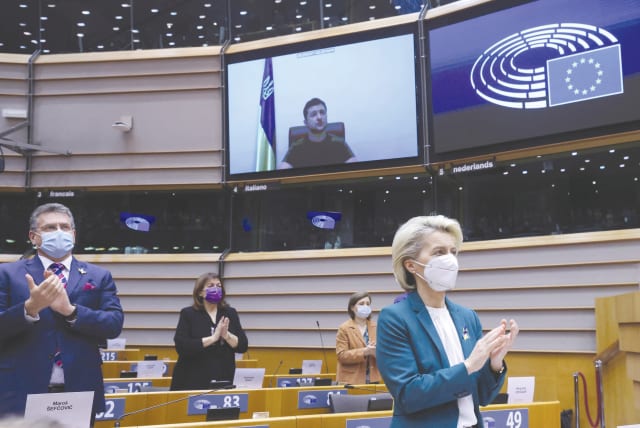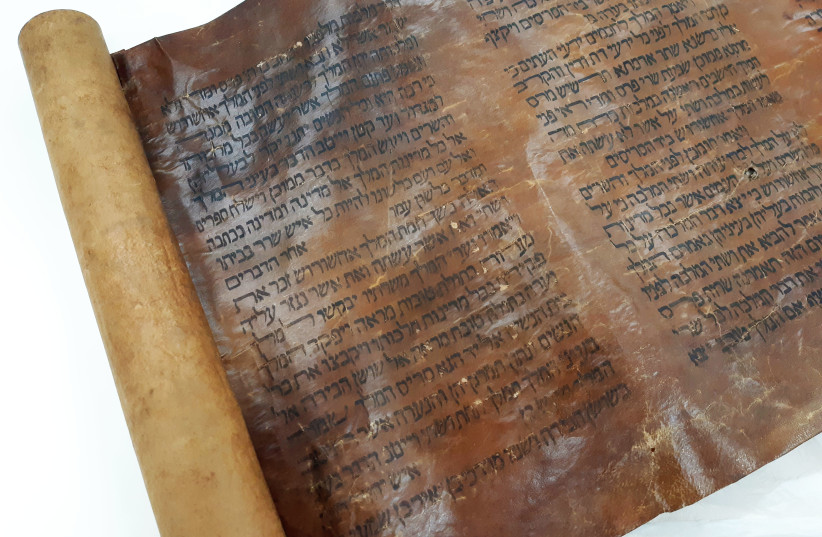Purim to Putin: Insights on the Ukraine war from the Book of Esther - opinion

If we want to understand the current war, I believe that we can find some enlightening parallels in the Book of Esther.
The Rashbam relates that his grandfather, Rashi, said, “if he had the time, he would need to make other commentaries l’fi hapeshatot hamithadshim b’khol yom” (according to the simple meanings which are renewed every day). Yet, if it’s the pshat (simple meaning), how can it be renewed every day? Perhaps, it means that when we study a biblical text, we arrive at a different pshat, according to our specific time and place. The text of the Bible may not have changed, but we have.
Since February 24, when Russia invaded Ukraine without rhyme or reason, I have been reading the Book of Esther in a new way.
I have a personal connection to Ukraine. My grandfather, Rabbi Mordechai Ya’akov Golinkin, was born in Kherson in 1884, the same Kherson that was captured by Russia on March 2. He was the chief rabbi of Zhytomyr, some 150 km. west of Kyiv, during World War I and there my father, Rabbi Noah Golinkin of blessed memory, was born in 1913.
For the past thirty years, the Schechter Institutes, which I head, have been running the very successful Midreshet Schechter network of schools, synagogues and Ramah summer camps in Kiev, Kharkov, Odessa and Chernowitz, in partnership with Masorti Olami. Indeed, Schechter recently purchased and refurbished a beautiful two-story building for our synagogue-school in Kyiv – which opened just six weeks ago!
Thus, for me, these cities are not dots on a map, they represent the incredible rebirth of Jewish life in Ukraine since 1991, which has been all but destroyed in the past few weeks.
If we want to understand the current war, I believe that we can find some enlightening parallels in the Book of Esther. We read there (3:5) that Haman decided to murder all the Jews without any intelligible reason: “When Haman saw that Mordecai would not kneel nor bow down before him, he was filled with rage”. He then decides to murder all the Jews and pays Ahasuerus handsomely for the right to do so.
And what of Russia today? When Putin saw that Zelensky and the Ukrainians would not kneel, nor bow down before him, he was filled with rage and he decided to invade Ukraine without any provocation. In both cases, a megalomaniac with absolute power did something outrageous without any provocation, just because he wanted to and had the power to do so.
And what was the reaction?
In Persia some 2,500 years ago, the Jews reacted in three stages. The first stage was shock or confusion: “And the King and Haman sat down to drink and the city of Shushan was confused” (3:15).
Furthermore, “Mordecai tore his clothes, and put on sackcloth and ashes... and cried with a loud and a bitter cry... And in every province that the King’s command and decree reached, there was great mourning among the Jews, with fasting, weeping and wailing; and many lay in sackcloth and ashes” (4:1-3).
The second stage was diplomacy. Mordecai sent Esther Haman’s decree via Hatakh “to show it to Esther and inform her; and to charge her to go to the king, and to appeal to him... for her people” (4:8). Esther immediately undertook this dangerous diplomatic mission and in the course of two banquets (chapters 5 & 7), brilliantly convinced Ahasuerus to hang Haman.
The third stage was war. We are informed in chapter 9: “And the Jews gathered in their cities to attack those who sought their harm”; “so the Jews struck at their enemies with the sword”; “the rest of the Jews who were in the king’s provinces likewise gathered and fought for their lives and they disposed of their enemies, killing 75,000 of their foes.”
We have seen the exact same three stages in the war in Ukraine. The first stage was shock. No one believed that Putin would do such an immensely foolish and evil thing. After all, it made no more sense to invade Ukraine than it made sense for Haman to destroy all of the Jews of Persia.
The second stage was diplomacy, which President Volodymyr Zelensky, who is a true hero, has conducted in a brilliant fashion. Like Esther, “he appealed... for his people” to the EU, NATO, the UN, Israel, and to the US Congress, to provide arms, supplies, an economic boycott and a no-fly zone – whatever it takes to save his people and his country.
The third stage was war. Putin thought that he would march into Ukraine unopposed, impose a puppet regime and occupy Ukraine. But just like in ancient Persia, he succeeded in uniting the entire Ukrainian people against him, including 16,000 volunteers from abroad. As many as 12,000 Russian soldiers have already been killed and many more have surrendered.
And what can Jews in Israel and the Diaspora do to help?
Esther says to Ahasuerus (8:6): “For how can I bear to see the evil that will befall my people? And how can I bear to see the destruction of my kindred!”
The Rambam expressed this approach in a legal fashion. After summarizing the Talmudic requirements of a Purim feast, mishloah manot (sending food to friends) and matanot le’evyonim (gifts to the poor), he adds a paragraph in his Laws of Megillah (2:17), which is not found in the Talmud: “It’s preferable for a person to increase his donations to the poor than to be lavish in his preparation of the Purim feast or in sending portions to his friends. For there is no greater and more splendid joy than to gladden the hearts of the poor, the orphans, the widows and the converts.”
In other words, the main thing on Purim is not to overeat, get drunk or send fifty packages of mishloah manot to friends, but to give money to the poor and to gladden the hearts of the unfortunate.
On February 27th, we sent out our first request for donations to help the over 1,000 children and adults in our schools and synagogues in Ukraine. I have been overwhelmed by the response. Over 600 people from all over the world have donated money to Schechter and Masorti Olami.
This money is being used to provide food, transportation within Ukraine, to rent apartments and hotel rooms in Chernowitz, which has become a city of refuge and a way station for over 500 people, and to buy plane tickets from Romania to Budapest, Berlin and Israel. All of these donors have heeded the words of Esther and Maimonides.
And what of the future?
“I am neither a prophet nor the son of a prophet,” but I believe that in the end, Putin will fail. As Zeresh said to Haman (6:13): “You shall not prevail against him, but shall surely fall before him.” A wicked tyrant may succeed in the short term, he rarely succeeds in the long term.
We all hope and pray that this war will end quickly. In the meantime, we must do everything in our power to help the Jews of Ukraine “for all Jews are responsible for one another” (Shevuot 39a) as well as any non-Jew who asks for help “for whoever sustains one soul, is considered by Scripture as if he had sustained the entire world” (Mishna Sanhedrin 4:5).
The writer is president of the Schechter Institutes, Inc. in Jerusalem. Donations to help the Jews of Ukraine can be made at https://schechter.edu/donate-ukraine-campaign/C/PurimJerusalemPostMarch2022.
Jerusalem Post Store
`; document.getElementById("linkPremium").innerHTML = cont; var divWithLink = document.getElementById("premium-link"); if (divWithLink !== null && divWithLink !== 'undefined') { divWithLink.style.border = "solid 1px #cb0f3e"; divWithLink.style.textAlign = "center"; divWithLink.style.marginBottom = "15px"; divWithLink.style.marginTop = "15px"; divWithLink.style.width = "100%"; divWithLink.style.backgroundColor = "#122952"; divWithLink.style.color = "#ffffff"; divWithLink.style.lineHeight = "1.5"; } } (function (v, i) { });

